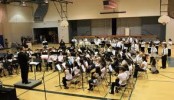Whatever Happened to Music Education?
 In writing a recent blog, inspired by Gustavo Dudamel’s orchestral version of a popular Puerto Rican band’s hit song, I began to muse on the subject of music education: in Venezuela and the U.S..
In writing a recent blog, inspired by Gustavo Dudamel’s orchestral version of a popular Puerto Rican band’s hit song, I began to muse on the subject of music education: in Venezuela and the U.S..
There are a million kids enrolled in Venezuela’s music system, called El Sistema. Some of them, like Gustavo Dudamel, rise to the top. Then there was the at-risk kid, Edicson Ruiz, who got off Caracas’ dangerous streets and joined El Sistema. He learned the bass from scratch and won an audition for the Berlin Philharmonic. No small feat. Watching Dudamel conduct the huge Simon Bolivar Youth Orchestra is truly inspiring. Classical music isn’t boring when played with that kind of energy and passion. And by kids no less, which makes it even better. And many of these kids were rescued from a life of crime and gang warfare. Sounds like a good idea for U.S. cities.
Music education is important: it gives kids a chance to develop another language, a chance to explore another part of their minds.
I’ve done hundreds of interviews with musicians over the past 30 years and I’ve often noted that these artists were not verbally gifted. They didn’t give great interviews either. But when playing music an altogether different voice spoke up: eloquent, elegant, compelling. Charlie Parker, when given a Down Beat magazine award by the late critic Leonard Feather, sounded downright dumb. When Jean Paul Sartre told Parker he liked his new bebop music, Parker replied “I like your music too”. He had no clue as to who his famous philosopher fan was. But look at his music. Parker was not only a genius musician who blew everybody else away, but he, like Bach, invented a whole new musical language. Ditto for even the great Coltrane, not exactly a man of many words. Thelonious Monk was even more elliptical with speech, but he was a genius composer of evergreen jazz classics.
Back in the day when I was a kid, there was music education in public schools. Kids got instruments and didn’t have to pay for private lessons their parents might ill afford. That is largely gone now. And sadly. The creativity involved in music making can help kids find outlets, purpose, and keep off the streets. Away from mindless pursuits like video games and TV. Music can organize and improve young lives, be participatory rather than just passive. Without music education, otherwise gifted youth can wind up in mediocre jobs, gangs, or even prison. There could be thousands of gifted musicians we’ll never know about who could make positive contributions as teachers and role models in sharing the gift and joy of music. Like the ex-con who’s now playing with the Berlin Phil.
We see such good things happening in Venezuela. Whether or not you like Hugo Chavez or not, he’s spending his oil money on something priceless. Gustavo Dudamel has brought some of that enterprising musical education spirit here, as the following Huffington Post article demonstrates, but we could surely be doing much more. There’s much more in life for young people than just following Justin Bieber’s every move.
Here is (again) the link to the Huffington Post article about El Sistema. The video is really great.
http://www.huffingtonpost.com/2011/11/13/la-takes-baton-as-flagshi_0_n_1091093.html
← BACK
